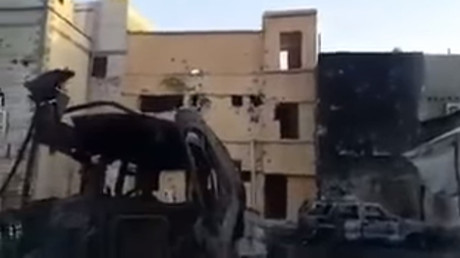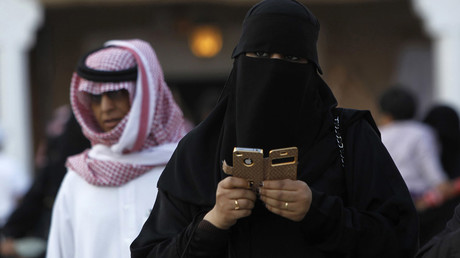“This package of defense equipment and services support the long-term security of Saudi Arabia and the Gulf region in the face of Iranian threats, while also bolstering the Kingdom’s ability to contribute to counter terrorism operations across the region, reducing the burden on the US military to conduct those operations,” the White House said in a statement, as cited by CNBC.
President Trump and the Saudi king are participating in a signing ceremony for a number of US-Saudi agreements.
Donald Trump is the first American president to make Saudi Arabia, or any majority Muslim country, his first stop overseas as president. The nine-day trip will also include Israel, the Palestinian territories, Brussels, the Vatican, and Sicily.
“I think it is striking that the president during his campaign made it—made it pretty clear that he’d like to get out of these wars in the broader Middle East, but—and pay attention to nation-building at home while his first stop is the Middle East, his first foreign trip is the Middle East,” Elliott Abrams of the Council on Foreign Relations (CFR) said on Monday.
“Previous presidents have gone to Canada or Mexico first since Jimmy Carter, everyone since Jimmy Carter, Canada or Mexico. Carter went to Europe first. So, this is—this is a first, to put the Middle East on the top of the agenda and make it the first trip,” he added.
King of Saudi Arabia Salman bin Abdulaziz Al Saud announced on Saturday that Trump’s visit to the kingdom would boost ties between the two countries and help step up global security.
Oil giant Saudi Aramco is expected to conclude $50 billion in deals with US companies on Saturday, Aramco Chief Executive Amin Nasser told reporters in Riyadh.
A senior White House official, who spoke to Reuters on condition of anonymity one week ahead of Trump’s visit to Riyadh, told the agency that the arms package could end up surpassing $300 billion over one decade to help Saudi Arabia enhance its defensive capabilities, while still maintaining Israel’s qualitative military edge over its neighbors.
“We are in the final stages of a series of deals,” the official said.
Sources told Reuters earlier this month that the arms package includes a Terminal High Altitude Area Defense (THAAD) missile defense system from Lockheed Martin, similar to the one being made operational in South Korea, which costs around $1 billion.
The countries have also been negotiating over a C2BMC software system and a package of satellite capabilities, also provided by Lockheed. The Bradley Fighting Vehicle and M109 artillery vehicle manufactured by BAE Systems PLC could also be included in the package, sources told Reuters.
There is reportedly more than $1 billion worth of munitions, including armor-piercing Penetrator Warheads and Paveway laser-guided bombs made by Raytheon.
The US has been the main supplier of military supplies to Saudi Arabia and provides maintenance and training to Saudi security forces.
The US delivered major weapons to at least 100 states in 2012–16, a significantly higher number of export destinations than any other supplier, the Stockholm International Peace Research Institute (SIPRI) said in February, noting that Saudi Arabia proved to be the largest recipient, accounting for 13 percent of US arms exports.
“The flow of weapons to Saudi Arabia from the USA is likely to remain high due to deliveries of 154 F-15SA combat aircraft, which began in 2016. This is despite calls in the US Congress during 2016 for restrictions on arms supplies to Saudi Arabia in response to Saudi military operations in Yemen, many causing civilian casualties,” the report said.
Riyadh said there was “a historic turning point” in bilateral relations after President Trump welcomed Deputy Crown Prince Mohammed bin Salman Al Saud to the White House in March.
“Relations had undergone a period of difference of opinion,” a senior adviser to the crown prince said in a statement after the meeting, as cited by Bloomberg.
“[The] meeting has put things on the right track, and marked a significant shift in relations, across all political, military, security and economic fields. All of this is due to President Trump’s great understanding of the importance of relations between the two countries and his clear sight of problems in the region.”
The White House said in a statement that Trump “provided his support for developing a new United States-Saudi program, undertaken by joint US-Saudi working groups, and its unique initiatives in energy, industry, infrastructure, and technology worth potentially more than $200 billion in direct and indirect investments within the next four years.”
With multi-million dollar arms deals on the US-Saudi agenda, analysts note that Trump is unlikely to raise the subject of human rights on his visit to Saudi Arabia, which has one of the worst human rights records in the world.
“Trump, during the campaign, blamed Saudi Arabia – and, I would argue, somewhat correctly – for playing a role in the 9/11 attacks, the greatest terrorist attack on American soil. At the same time, he was inking – while on the campaign trail – he was inking deals with eight hotel interests in Saudi Arabia to deepen his business ties. I mean hotels, casinos – a lot of it has to do with money laundering and Trump is really a master of that. The Gulf States have these great sovereign wealth funds, and Trump and Jared Kushner, his son-in-law, want to tap into those. So, the ties are deep between Trump and the Saudis, far deeper than other foreign countries which we hear a lot about,” author and investigative journalist Max Blumenthal told RT earlier this week.
“You can talk about the internal human rights abuses, the fact that Waleed Abulkhair, the Saudi human rights lawyer, has been jailed for 15 years; Ali Al Nimr, the son of the executed cleric, is in jail; Raif Badawi, the Saudi atheist, is in jail; women are not allowed to drive; the treatment of foreign workers – Trump is not going to bring these aspects up. Then you have Saudi Arabia’s pulverization of Yemen, where civilians are being treated like protesters outside of the Turkish ambassador’s residence by Erdogan’s bodyguards. It is just getting absolutely pulverized,” Blumenthal pointed out.
Human Rights Watch (HRW) said in a statement that in 2017, Saudi authorities “continued to arbitrarily arrest, try, and convict peaceful dissidents. Dozens of human rights defenders and activists are serving long prison sentences for criticizing authorities or advocating political and rights reforms. Authorities systematically discriminate against women and religious minorities.”
In January of last year, Saudi Arabia executed 47 men for terrorism-related offenses, including prominent Shia cleric Nimr al-Nimr, who was convicted following a “deeply flawed trial,” according to HRW.
“They got mad because he defended everyone who was oppressed by this government,” Mohammed al-Nimr told RT.
The Saudi-led coalition has conducted an airstrike campaign against Houthi forces in Yemen that includes the use of banned cluster munitions and apparently unlawful strikes killing civilians, HRW notes.
Source Article from https://www.rt.com/news/389054-trump-saudi-first-visit/?utm_source=rss&utm_medium=rss&utm_campaign=RSS
Related posts:
Views: 0
 RSS Feed
RSS Feed

















 May 20th, 2017
May 20th, 2017  Awake Goy
Awake Goy 


 Posted in
Posted in  Tags:
Tags: 
















